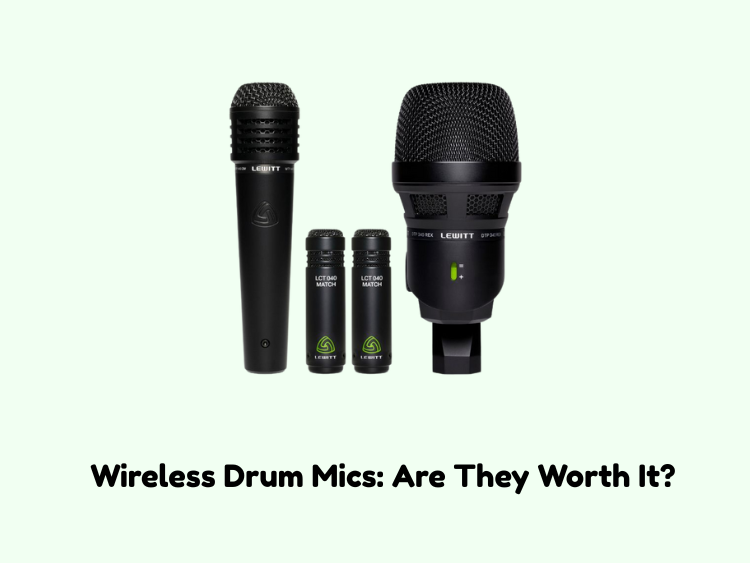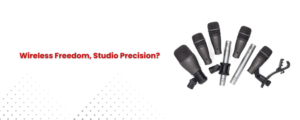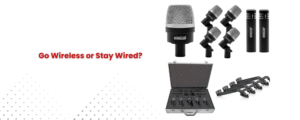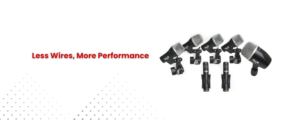Drum sets have been live and rear acoustic instruments that produce sound vibrations in the thick air, even in crowded atmospheres very well with plenty of smoke surrounding. But do they justify the expense? We will go over the main advantages, disadvantages, and applications of wireless drum mics.
The Basics of Wireless Drum Mics
Exposure signals from wireless drum mics are typically transmitted over UHF or 2.4GHz frequencies to a receiver connecting to the mixer. There are a number of wireless mic systems for drums developed by known brands like Shure, Sennheiser, AKG, 5Core, etc. Most systems consist of several microphone units, a stable receiver and encrypted frequencies to allow for stable audio recording without major loss in quality.
In recent years, as tech has advanced, wireless mic systems have improved latency, signal stability, and audio fidelity. Professional sound engineers can now experiment with wireless equipment, particularly at live stages and for pumping music genres with lots of movement.
Benefits of Wireless Drum Microphones
Importance of Mobility
The drummers can move freely as there are no cables, enabling dynamic acts on stage.
Speedy Configuration
Removes the headache of cable management and enables quick set-up, vital for touring musicians.
Less Cluttered Stage Look
No visible cables on the stage means less risk to trip and better look.
Less Cable Noise
With long cable runs, there can be interference or static problems, but this reduces them significantly, providing a clean audio signal.
Less Need for Cables
Again, lighter, you don’t need cables you need to transport and pack them especially with traveling bands.
Wireless Drum Mics: Drawbacks
Higher Cost
Wireless systems are typically pricier than wired alternatives because they rely on technology like transmitters and receivers.
Battery Dependence
Needs to be charged regularly or have its batteries replaced, making one extra maintenance step.
Latency
Some systems have latency that can cause timing issues in live performances.
Interference Problems
Multiplexing frequency environments — especially, but not only, within the same venue where many wireless devices operate.
Audio Compression
Several wireless systems employ compression methods, which means that they can make a slight change to the original sound; some may not be suitable for studio recordings.
When Not to Use a Wireless Drum Mic
Wireless drum microphones come into their own in certain situations where wired setups are not the best fit. Below are some of the top use cases:
Live Performs
This is highly useful in the case of bigger stage setups with high mobility.
TV and Broadcast Productions
A cleaner, cable-free look improves the aesthetics for televised performances and advises for music videos.
On the Road
Quicker setup and breakdown make for easier and more efficient travel.
Outdoor Events
Outdoor festivals and open-air concerts benefit from wireless configurations as they dramatically reduce logistical challenges.
Cathedral and Worship Service
Many church bands rely on wireless mics for a tidy setup without sacrificing sound quality.
Wireless Drum Mics Alternatives
So, do you need wireless drum mics? So here are some alternative solutions:
Wired Mics
Higher-end models with better quality, stable in studio environments with very low running costs (you have the flexibility of utilizing a PC too).
Hybrids
Working with a combination of both wired and wireless mics — such as wireless mics for overheads and wired for essential drums like snare and kick — represent a buoyed approach.
Wireless XLR Transmitters
Convert wired mics into wireless with minimal investment, perfect for those easing over the new tech but not wanting to throw cash into a complete switch.
Best Wireless Drum Microphone Systems
So, getting a good wireless drum mic system is very important whether you want a good sound to be achieved or not. Here are a few of the big recommendations:
Shure PGXD14
Reliable, low-latency, but pricey; excellent for pros.
Sennheiser EW 500 G4
Industry-grade sound with various frequencies is perfect for large productions.
5Core Drum Mic Kit
Affordable, perfect for newcomers and small events.
Audio-Technica System 10 PRO
A solid mid-range offering with a solid connection and expansion dynamic.
AKG DMS100
For high-quality audio such as studio recordings, this one is digital wireless with good anti-interference capability.
Do Wireless Drum Mics Carry Any Value?
These are great for live performances and broadcasts but aren’t always necessary for studio recording, especially where budget is a concern.
Do You Need the Best Wireless Drum Mics?
Professional Drummers
If you do a lot of live gigs that demand you to be able to move around freely, drum wirelesses can be valuable.
Bands on Tour
This is an awesome asset that cuts down your setup and teardown time.
Venue Owners
Wireless drum mics increase flexibility for live performances you host.
Broadcast Engineers
For television and film, wireless mics still hold the edge with clean audio capture and no visible cables.
Who Will Probably Stick to Wired Mics?
Studio Engineers
Many studio engineers favor wired mics for their high-quality and loss-less audio fidelity.
For Beginners and Hobbyists
If you are on a budget, then buying good quality wired microphones could be a better option.
Small Venues
When mobility is not a big factor, traditional wired setups continue to be a reliable option.
Final Verdict
Whether you opt for wired or wireless, investing in high-quality brands will yield top results. If you’re a wireless drummer who values mobility and convenience, drum mics can be worth the investment. But if audio quality and dependability are paramount, a carefully positioned wired mic rig might be a better bet.
Ultimately, your needs for performance, budget, and reliability will dictate your choice. Further, if possible, try different systems before pulling the trigger to see which one best fits your particular configuration.





